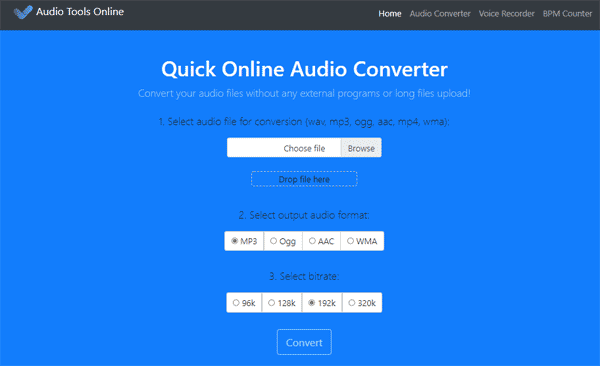
The ubiquity of broadband Internet has led to an explosion of online services for audio and even video processing. Just a couple of years ago there were only a few such services, but today they are firmly in the lead in search results. At first glance, the idea is good - you have access to the necessary tool anywhere and from any device. If you don't use it that often, you don't have to buy or install anything on your device. But is it really that good?
1 Audio Conversion in the Cloud
This option appeared first and was focused on renting server capacity for your needs. We won't look at paid subscriptions and go straight to to consideration of free services. All the pros and cons of both options will be the same. The undoubted advantage is the ability to process audio even with a weak smartphone, i.e. the service capability is not limited by your hardware. Moreover, you save battery power, because energy is used only for uploading and downloading.
However, there are enough disadvantages here, too. The most important one is your privacy. You trust your data to a third party, relying only on their integrity. For many, this will already be an insurmountable obstacle. What's next? The efficiency of the service will largely depend on the quality and speed of your Internet connection. What is the point of converting a song in 15 seconds if it takes 15 minutes to transfer the data? The last disadvantage concerns only for free services and is connected with the guaranteed time of service. If the server is busy processing other requests you can wait in the queue indefinitely.

2 Local Conversion in the Browser
This method is relatively new and allows habitual applications to be compiled into a web assembly to run within the browser. The idea behind such services is to safely execute code inside an isolated sandbox on any device. In light of recent hacking attacks, we are all mindful of security, don't we? The second advantage is that the data is processed on your device and is not transmitted anywhere. So there is nothing wrong with privacy.
And now about the disadvantages - there are a handful of them. The code in the browser is unacceptably slow without multi-threading. For audio files it is bearable, but not for video files. Since no native code is used in the browser, your device resources are consumed extremely wastefully, and your data is limited in size. Not every smartphone will be able to work correctly with this service due to limited RAM capacity. Quite often the processing in the browser ends up crashing the application and wasting time. Browsers that do not guarantee full compatibility also contribute to the list of problems.

3 Common Features
Here I will list the nuances that cannot be attributed to unambiguous advantages or disadvantages. You just need to know about them and take them into account in your work. All of the online services I have seen have a greatly simplified interface. This can not be attributed to the limitations of browsers, because we all know how we all know how complex sites are created now. From this I conclude that the interface is simplified deliberately, to reach the maximum audience.
It is no secret that online services use well-known open source software to process audio files. These programs come from the Linux world and do not require adaptation to run on servers. The most common one is the one called FFMPEG, which is available on all platforms and which you can install locally at any time. The description of this product is worthy of a separate article. Suffice it to say that its creators themselves do not remember all its capabilities.
4 Conclusion
As we can see, in both cases, the disadvantages outweigh the few advantages. It is impossible to combine both approaches with your current infrastructure. You either have to put up with high traffic consumption and privacy violations, or slow and unstable performance without guaranteed results. On the other hand, classic applications installed on your device do not have all these disadvantages. Your computer's resources are used as efficiently as possible, and your data remains under your complete control. It is worth mentioning that developers of classic applications can provide technical support and further development of their product. Online services do not develop software themselves, but simply run someone else's products in the cloud and have no idea how they work. The on-demand principle may seem advantageous, but it's now available for desktop applications as well. So does web services make sense? Definitely yes, but only as a backup tool when you can't use your computer or you don't have one.
